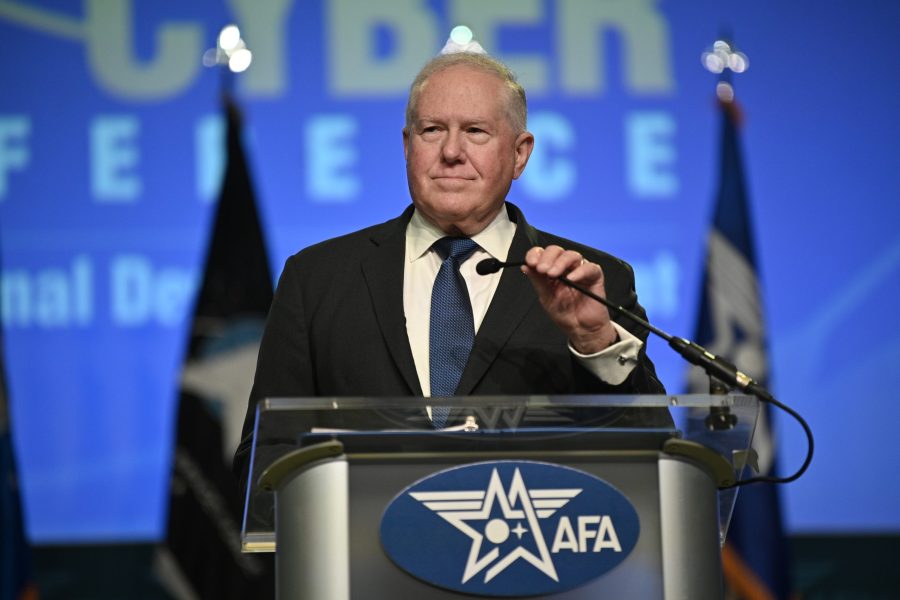With the threat of a government shutdown looming, Secretary of the Air Force Frank Kendall issued an urgent plea to Congress at AFA’s Air, Space, & Cyber Conference on Sept. 11.
“We have already lost far too much time waiting for Congress to act on our modernization funding needs,” Kendall said during a keynote address.
In his speech, Kendall outlined three major asks from lawmakers:
- The authority for the Department of the Air Force to begin work on its modernization efforts.
- The money to fund those modernization efforts
- The end to an ongoing legislative hold on nominations by Sen. Tommy Tuberville (R-Ala.) that has prevented more than 100 general officers from across the Air Force and Space Force from taking on new positions or new ranks.
“We urge you to give us the authorization, appropriations, and confirmations that it is your duty to provide for our military,” Kendall said in remarks directed at lawmakers.
The Department of the Air Force has sweeping plans for a whole host of modernization programs like Collaborative Combat Aircraft, Next Generation Air Dominance, and the LGM-35 Sentinel intercontinental ballistic missile. But Congress is deadlocked in budget negotiations, with the end of the fiscal year looming at the end of September.
Already, Kendall noted, the chances of getting a fiscal 2024 budget on time are all but finished. Instead, he argued Congress must work to mitigate the damage.
“Waiting does not make us more competitive or enhance deterrence,” Kendall said.
In what has become common practice in Washington, if a budget is not agreed to by the start of the fiscal year, lawmakers can a “continuing resolution” to avert a government shutdown. But CRs only fund the government at current levels and halt “new starts”—projects or activities that were not previously funded or authorized. Collaborative Combat Aircraft would be perhaps the most high-profile Air Force new start in 2024.
“Do not extend any CR beyond December,” Kendall said. “We can manage a short CR as we have many times. Beyond that, much more serious damage would be done to American security.”
As Kendall noted, starting the year under a CR has become commonplace. But he pressed further in urging Congress not to enact blanket cuts to the military or allow a repeat of 2013, when lawmakers triggered automatic, large cuts—known as budget sequestration—across the U.S. government after failing to resolve a spat over funding levels.
“We endured this kind of irrational cut 10 years ago and are still recovering,” Kendall said. “We never want to do something like that again.”
Such a move would have “severe reductions in modernization and readiness,” he added.
A prolonged continuing resolution and budget cuts could go hand in hand—as part of their deal earlier this summer to raise the debt ceiling, the White House and Congress agreed to a provision that states that if any part of the government is funded by a CR starting Jan. 1, there will be a 1 percent cut for all discretionary spending until a new budget is approved.
Beyond his concerns for fiscal 2024, Kendall also reiterated his top legislative proposal for Congress—granting authority to the Air Force and the other military departments to start critical programs without a budget, what he termed a “quick start” proposal.
That would allow the Air Force and Space Force to begin “our highest priority and most urgent programs immediately without having to wait for even a regular budget cycle—to say nothing of a CR,” Kendall said. “This initiative will prevent us from losing ground unnecessarily in the military technological race with China.”
While Kendall is famous for defining his top three priorities as “China, China, China,” he insisted those words and other slogans aimed at modernizing were not bluster.
“For those of you who may be wondering when we’ll get back to normal, this is normal,” Kendall said of the U.S. competition with China. “We have a well-resourced strategic pacing challenge that is showing no sign of slowing down or quitting. We are in a race for technological and operational superiority that we can expect to last for the next several decades.”
